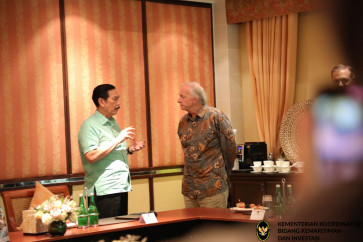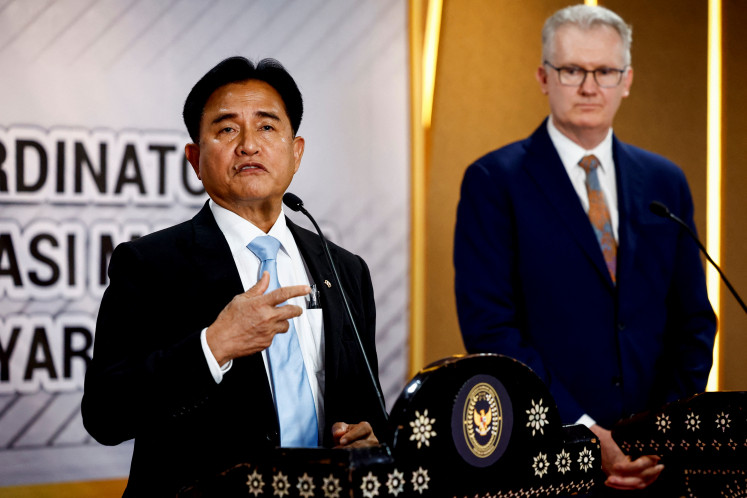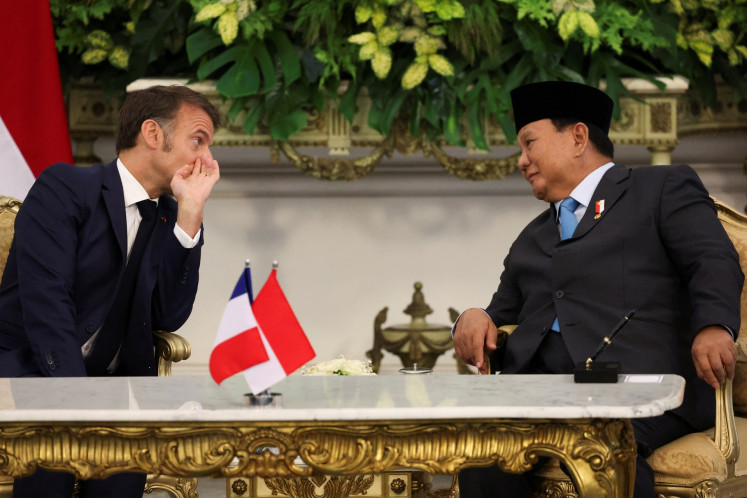WERNER KRAUS: Giving back to Indonesia
Of all its 240 million population, Indonesia seems to have required the help of one German curator to display the great work of the country’s painter, Raden Saleh, in the artist’s homeland
Change text size
Gift Premium Articles
to Anyone

O
f all its 240 million population, Indonesia seems to have required the help of one German curator to display the great work of the country’s painter, Raden Saleh, in the artist’s homeland.
That curator’s name is Werner Kraus, a lecturer, expert in Southeast Asian studies and art lover, who has been obsessed with the artist for more than 30 years.
The 68-year-old explained that his first “encounter” with the art master took place in 1976 in one of the huge libraries at Cornell University in the US, where Kraus received a Master’s degree in modern Southeast Asia.
“I found a book on Raden Saleh ... I discovered Raden Saleh spent a long time in Germany, especially in a place called Coburg, and I was born near Coburg,” he said of his meeting with the father of Indonesia’s modern art.
This fact stunned the man and also triggered his curiosity in the Indonesian artist, who lived in Europe over 180 years ago.
From that moment, his pursuit of Raden Saleh began.
He said he went to museums and galleries all over the world to look for traces of the Javanese-born painter, who spent a quarter of his life in Europe.
After all the years of searching and publishing a number of articles on the artist, Kraus came to Jakarta six years ago with the goal to hold an exhibit displaying Raden Saleh’s paintings.
His decades of effort and hard work to find the maestro’s paintings reached a climax in Indonesia’s capital, where 40 of the painter’s stunning artworks were exhibited to great public enthusiasm.
Thousands of visitors visited the “Raden Saleh and the Beginning of Modern Indonesian Painting” exhibit at the National Gallery between June 3 and 17, making it one of the most visited art exhibitions in the country so far.
Beyond its success, the curator has seemed to take the showing as something more personal, considering it a gift to his “second home”, Indonesia.
“I always want to give something back to Indonesia and this exhibition is my gift to Indonesia and I am so happy that it has been nicely received,” he said in a recent interview with The Jakarta Post.
In order to understand his love of Indonesia, the man helped the Post travel back in time to the early 1970s when he first set foot in the archipelago.
The man came to Indonesia as a civil engineer on a mission to explore Nias, North Sumatra. He said he was clueless, not only because of the language barrier but also the differences in mindset and behavior.
Having so many questions about Indonesian culture, he returned to Germany and decided to ditch his civil engineering career to study Southeast Asia at the University of Heidelberg.
And as if that was not enough, he got a Master’s degree in a similar subject in the US.
Despite years spent in the classroom, the man admitted that university education had failed to provide him with a better understanding of Indonesia. He discovered in the end that the best way to learn about a country was to experience the culture directly.
“Just by sitting in a warung [food stall] and having some kopi tubruk [unfiltered coffee] and talking to the people you will get more [of an] understanding about this country,” Kraus explained.
“[Indonesia] is like a second home to me and whenever I got off the plane from Soekarno-Hatta International Airport, and smelled the first kretek [clove] cigarette. I say: ‘Aaah’, back home again,” said the man who visits Indonesia regularly.
Through the exhibition, the man said he also wanted to speak about his other goal of creating deeper understanding between Indonesian and European communities. The curator seemed to be inspired by Raden Saleh, who also shared the same mission during his stay in Europe.
“I am certainly happy if I could contribute a little bit to this movement of understanding and peace,” said the man, who has been honored as a “Bridge Builder” (between Europe and Indonesia) by the Pacific Times paper.
Next on his list is publishing a Raden Saleh biography, a culmination of his research and work for decades. The 650-page book that includes illustrations is expected to be released soon.
However, Kraus said his quest for Raden Saleh is not over yet, as he is still looking for a missing 300-page manuscript of the painter’s diaries, which was believed to have been destroyed during World War II.
But what’s next after Raden Saleh? The man revealed that he was interested in curating an exhibition on the collection of Sukarno, Indonesia’s first president, who was also an avid art aficionado.
Kraus discovered that some of the president’s collection included paintings from China, Russia and even from the celebrated Mexican artist Diego Rivera.
For a man who never studied art formally, Kraus seems to have an impeccable knowledge of the subject, especially Indonesian art.
Kraus said he developed his interest in art while studying engineering in Munich, known as a town with many beautiful museums.
It was his penchant for art that led him to his obsession with Raden Saleh. However, things are now getting personal with the man feeling emotionally connected to the maestro.
“If you research a person for such a long time, then of course you also find similarities. He was an Indonesian who went to Germany and I am a German who goes to Indonesia again and again,” said the curator, who has considered his artistic subject his friend.
And as a dear friend, Kraus seems to know all about Raden Saleh, including his bad side.
During the interview, he slipped in some information about how the painter was a big spender during his years in Germany and how he was a jealous man who didn’t like people competing with him.
Such firsthand information along with the exhibition’s success and the upcoming biography may have won Kraus the label as the master of Raden Saleh. But from Kraus’ story, people can understand that all the hard work is nothing but a gift to his second home and virtuoso friend, who just celebrated his 200th anniversary.
Your Opinion Matters
Share your experiences, suggestions, and any issues you've encountered on The Jakarta Post. We're here to listen.
Thank you
Thank you for sharing your thoughts. We appreciate your feedback.









